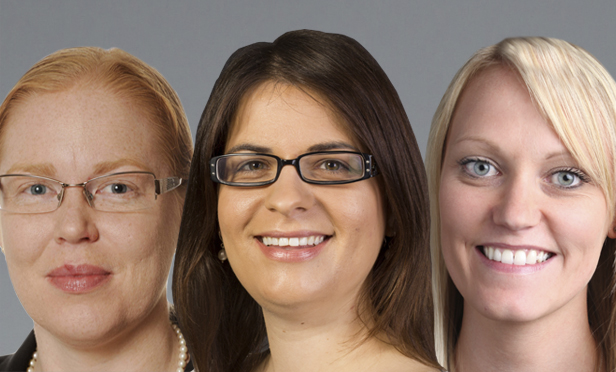Female partners on the mentors who helped them make their career breakthrough
Junior partners from firms including Slaughters, Linklaters and HSF on how mentors have contributed to their career success
March 16, 2018 at 08:28 AM
10 minute read
The path to partnership can often seem like something of a mystery for overworked associates, with the demands of their day job leaving them little time to think about personal development, networking, and what they need to be doing to make an impression on the people that matter.
However, the support of a mentor who has already made the step up can make all the difference, particularly for female lawyers for whom partnership may seem all the more unattainable.
To coincide with International Women's Day, we sought the views of a number of newly promoted female partners – all of whom were made up in the past four years – to find out how mentors helped them make the grade, and what they think law firms should be doing to make progress on gender equality.
Victoria MacDuff, corporate partner, Slaughter and May
Qualified: 2008
Made partner: 2016
Mentors: Dispute resolution head Sarah Lee, M&A head Roland Turnill and corporate partner Oliver Wareham
What have you learnt from your mentor? Sarah Lee taught me how to prioritise my time effectively as a junior partner. While I used to focus on deal doing as an associate, I am now looking to develop my practice and internal network and find time to develop other people. I have worked closely with Roland Turnill and he has been helpful on specific issues such as how to develop deep client relationships while not spreading yourself too thinly.
What are the key challenges to making the relationship work effectively? One challenge is ensuring that you move the relationship beyond a nice chat over coffee. You have to be clear about what you want to get out it. You also have to put enough time and effort in, but that does not necessarily mean you see your mentor every week or two weeks. You just need to be clear about what your relationship looks like. For more informal mentors, it is better to come up with a specific strategic issue so you have long-term conversations, keep touching base and it is not a one-off event.
What advice do you have for others considering mentorship? Embrace it, and don't be afraid to move mentors in a formal mentoring programme. People should be more willing to switch if there is not much more to be gained from the relationship. Both people are investing their time so they should make sure they have the right mentor.
What has been a career-defining moment for you? When I made the decision to come to the firm as a young associate two years' qualified from Maclays in Scotland. I think that was more important than becoming a partner because it had such an impact on my career path, which ultimately led to me becoming a partner.
What else would you like to see law firms do to improve gender equality in the workplace? Focus more on including male partners and colleagues in the dialogue. That is critical. We have had leadership programmes for associates that in the past have been geared towards women, but we have now rolled these out across both male and female associates so everyone can tackle these issues. I think educating everyone on what they can do to support women is very important.
 Tracey Lochhead, corporate partner, Linklaters
Tracey Lochhead, corporate partner, Linklaters
Qualified: New Zealand in 2003; England and Wales in 2010
Made partner: 2014
Mentors: Lots of different people, both men and women, and I suspect most would not obviously say they were my mentor, particularly those who are now fellow partners.
What have you learnt from your mentor? Encourage people to be the best they can be, and don't shy away from giving tough feedback where it is warranted. One mentoring session I won't forget was as a relatively junior managing associate where a partner I hugely respected took the time to discuss my career, challenged me on why I wasn't actively talking about partnership, and then gave me real feedback on what I needed to do to become a partner. His encouragement was pivotal in my decision to run for partnership and he has supported me throughout.
What are the key challenges to making the relationship work effectively? Honesty and mutual trust and respect. Both the mentor and mentee need to want to make it work.
What advice do you have for others considering mentorship? It is very rewarding for both the mentor and mentee and you get out of it what you put in. In either role you learn a lot about other people and yourself. For mentees, it is important to recognise that your mentor is not necessarily your sponsor for promotion, it is important to understand the different roles that people perform.
What has been a career-defining moment for you? Actively putting myself forward for partnership and getting it. Now, it is about building my practice and continuing to create multiple career-defining moments.
What else would you like to see law firms do to improve gender equality in the workplace? Not every woman is the same, so it is about creating an inclusive culture where everyone has the opportunity to succeed. Treating people the same is not treating people equally. It is important to recognise where assumptions need to be challenged or people need to be encouraged to take opportunities when they may not naturally put themselves forward.
 Caroline Rae, corporate partner, Herbert Smith Freehills
Caroline Rae, corporate partner, Herbert Smith Freehills
Qualified: 2007
Made partner: 2016
Mentor name: Corporate partner Alex Kay
What have you learnt from your mentor? Alex was also my trainee supervisor so has played an important part in shaping and developing my career over a long period of time – from learning my trade as a young M&A lawyer to building relationships with clients. My mentor encouraged me to become a partner right from the outset. As a junior lawyer, hearing that a senior partner believes in you is a very powerful message and definitely had a positive impact on my career.
What are the key challenges to making the relationship work effectively? It's like any relationship – trust, respect and good communication are all key features of a successful mentoring relationship. If any of these elements are missing, I think it will be challenging to work together effectively.
What advice do you have for others considering mentorship? If you don't have a mentor already, don't wait for one to come your way – go and look for one. Choose a person you respect and approach them directly. And don't be afraid to take the lead in arranging meetings and setting topics for discussion.
What has been a career-defining moment for you? Being promoted to the partnership was obviously a key moment for me, but there have been many important moments and transactions along the way. Calling my mother when my first M&A deal was on the front page of the Financial Times is up there as a highlight.
What else would you like to see law firms do to improve gender equality in the workplace? I would like to see more female lawyers being mentored and, more importantly, sponsored throughout their careers. Mentoring and sponsorship is not a new concept – men have benefited from this informally for years, but for various reasons, fewer women seem to have mentors and sponsors to support their ongoing performance and career progression.
 Natalie Trainor, TMT partner, Pinsent Masons
Natalie Trainor, TMT partner, Pinsent Masons
Qualified: 2002
Made partner: 2017
Mentor name: Through the firm's Reciprocal Mentoring scheme, senior partner Richard Foley. Informally, TMT head Simon Colvin
What have you learnt from your mentor? In our profession, we're surrounded by really impressive people and over the years I have lacked confidence and self-belief, often thinking that someone else is better than me; more deserving than me. Simon Colvin has always encouraged me to just keep doing what I'm doing, and not compare myself to or worry what others around me are doing. The more senior I've got, the more self-assured I've become, but I do still have to remind myself of that advice every now and then. Simon also recognised that my confidence issues were holding me back and recommended that I work with a coach to help build that, which has really helped me.
What are the key challenges to making the relationship work effectively? Probably the day job. Mentoring meetings, and the preparation, reflection and follow-up outside of that are all at risk of getting bumped for client work. As part of the kick-off meeting, it's important that you both agree to commit the time and to treat meetings as far as possible like any other work commitment.
What advice do you have for others considering mentorship? Get the ground rules straight from day one – for example, everything discussed is confidential unless you agree something can be shared; schedule regular meetings; and stick to the meetings as far as possible.
What has been a career-defining moment for you? I would say my third or fourth meeting with Richard Foley when we talked about partner role models. I remember talking a lot about not fitting into any of the existing moulds, and Richard urged me to 'just go create a new one'. I had just come back from maternity leave after my second son and found myself finding lots of reasons why this wouldn't be possible (or at best, difficult), and that the time was not right, but Richard challenged and encouraged me. It was a turning point for me, and by the end of the meeting, I felt empowered and determined to show that, not only was it possible, but that it was the right thing to do – for my own career and on behalf of other female lawyers. A big part of this is obviously about being a working mum working flexibly, but it is also about bringing a different approach – a 'softer' (but not weaker) way of doing things.
What else would you like to see law firms do to improve gender equality in the workplace? Talking from my own personal perspective, I found one-to-one coaching support invaluable. Coaching is often limited to partners, but extending it to others, particularly senior lawyers on the track, can really help with everything from self-confidence, resilience and mother's guilt to time management and team/people management.
For more, see:
This content has been archived. It is available through our partners, LexisNexis® and Bloomberg Law.
To view this content, please continue to their sites.
Not a Lexis Subscriber?
Subscribe Now
Not a Bloomberg Law Subscriber?
Subscribe Now
NOT FOR REPRINT
© 2025 ALM Global, LLC, All Rights Reserved. Request academic re-use from www.copyright.com. All other uses, submit a request to [email protected]. For more information visit Asset & Logo Licensing.
You Might Like
View All
How to Build an Arbitration Practice: An Interview with 37-Year HSF Veteran Paula Hodges

Scratching the Entrepreneurial Itch: Linklaters' AI Head On Becoming a Partner and GenAI Hallucinations

'Relationships are Everything': Clifford Chance's Melissa Fogarty Talks Getting on Big Deals and Rising to the Top
7 minute read
The 'Returnity' Crisis: Is the Legal Profession Failing Women Lawyers Returning From Maternity Leave?
8 minute readTrending Stories
Who Got The Work
J. Brugh Lower of Gibbons has entered an appearance for industrial equipment supplier Devco Corporation in a pending trademark infringement lawsuit. The suit, accusing the defendant of selling knock-off Graco products, was filed Dec. 18 in New Jersey District Court by Rivkin Radler on behalf of Graco Inc. and Graco Minnesota. The case, assigned to U.S. District Judge Zahid N. Quraishi, is 3:24-cv-11294, Graco Inc. et al v. Devco Corporation.
Who Got The Work
Rebecca Maller-Stein and Kent A. Yalowitz of Arnold & Porter Kaye Scholer have entered their appearances for Hanaco Venture Capital and its executives, Lior Prosor and David Frankel, in a pending securities lawsuit. The action, filed on Dec. 24 in New York Southern District Court by Zell, Aron & Co. on behalf of Goldeneye Advisors, accuses the defendants of negligently and fraudulently managing the plaintiff's $1 million investment. The case, assigned to U.S. District Judge Vernon S. Broderick, is 1:24-cv-09918, Goldeneye Advisors, LLC v. Hanaco Venture Capital, Ltd. et al.
Who Got The Work
Attorneys from A&O Shearman has stepped in as defense counsel for Toronto-Dominion Bank and other defendants in a pending securities class action. The suit, filed Dec. 11 in New York Southern District Court by Bleichmar Fonti & Auld, accuses the defendants of concealing the bank's 'pervasive' deficiencies in regards to its compliance with the Bank Secrecy Act and the quality of its anti-money laundering controls. The case, assigned to U.S. District Judge Arun Subramanian, is 1:24-cv-09445, Gonzalez v. The Toronto-Dominion Bank et al.
Who Got The Work
Crown Castle International, a Pennsylvania company providing shared communications infrastructure, has turned to Luke D. Wolf of Gordon Rees Scully Mansukhani to fend off a pending breach-of-contract lawsuit. The court action, filed Nov. 25 in Michigan Eastern District Court by Hooper Hathaway PC on behalf of The Town Residences LLC, accuses Crown Castle of failing to transfer approximately $30,000 in utility payments from T-Mobile in breach of a roof-top lease and assignment agreement. The case, assigned to U.S. District Judge Susan K. Declercq, is 2:24-cv-13131, The Town Residences LLC v. T-Mobile US, Inc. et al.
Who Got The Work
Wilfred P. Coronato and Daniel M. Schwartz of McCarter & English have stepped in as defense counsel to Electrolux Home Products Inc. in a pending product liability lawsuit. The court action, filed Nov. 26 in New York Eastern District Court by Poulos Lopiccolo PC and Nagel Rice LLP on behalf of David Stern, alleges that the defendant's refrigerators’ drawers and shelving repeatedly break and fall apart within months after purchase. The case, assigned to U.S. District Judge Joan M. Azrack, is 2:24-cv-08204, Stern v. Electrolux Home Products, Inc.
Featured Firms
Law Offices of Gary Martin Hays & Associates, P.C.
(470) 294-1674
Law Offices of Mark E. Salomone
(857) 444-6468
Smith & Hassler
(713) 739-1250










